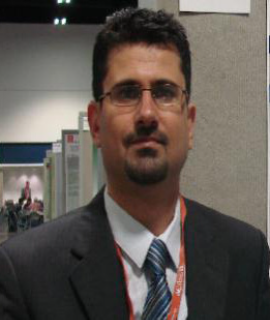Abstract:
Pepper (Capsicum annuum), as a warm-season crop, has low seed germination under wet and cold conditions due to susceptibility of seeds to fungal diseases. Treatment of pepper seeds with chitosan improved seed germination under cold conditions, which might be due to the induction of systemic acquired resistance in seeds by increasing chitinase activity. Therefore, the objective of this study was to test whether seed treatment with chitosan improved low temperature germination by increasing chitinase activity. Pepper seeds were imbibed in 0.01, 0.05, 0.1, 0.3, and 0.5% chitosan solutions, 1% acetic acid, or hydroprimed in distilled water. Seeds were also treated with 1% Benomyl [methyl 1-(butylcarbamoyl)-2-benzimidazole] fungicide for comparison with dry-untreated seeds. All seeds were slowly dried back to their original moisture content after treatment. Seeds were evaluated for germination, mean germination time, seedling length, and fresh weight in warm germination test, and for seedling emergence in cold test. Chitinase activity was measured for treated seeds and seedlings during germination. Seeds treated with chitosan or hydroprimed germinated faster and produced seedlings with higher length and fresh weight. Neither treatments had an effect on the final germination percentage in warm standard germination test (≥86%); however, seed treatment with chitosan or hydropriming improved seedling emergence in cold test. Seed treatment with chitosan increased the chitinase activity in seeds and seedlings compared with those from untreated-control treatment. In conclusion, seed treatment with chitosan increased chitinase activity. Greater chitinase activity would protect seedlings from fungal diseases at low temperature and enhance the ability of pepper to emerge under wet and cold conditions.
Biography:
Dr. Samarah holds a permanent appointment as a Professor at the Department of Plant Production at Jordan University of Science and Technology (JUST) in Irbid, Jordan where he has also served in various leadership positions at JUST including Head of Department of Plant Production, Assistant and Vice Dean of Scientific Research, and Vice Dean of Graduate Studies. Dr. Samarah’s research interests include the interaction effect of seed maturity and environmental conditions on seed quality of important field crops; the effect of drought stress on seed production of field crops; the biochemical and molecular processes of crops grown under stress; studying mechanisms to produce genetically modified crops that tolerate drought stress; acquisition of seed desiccation tolerance and vigor during seed development and maturation; cultural practices to improve crop productivity in rainfed Mediterranean regions; relationship of seed quality tests to field emergence under semiarid rainfed Mediterranean conditions; breaking seed dormancy, enhancing seed germination and seedling establishment of major crops in Jordan. Dr. Samarah consulted on multiple projects involving the seed industry including the “Conservation and Sustainable Use of Dry Land Agro-biodiversity in West Asia” project. He has received several distinctions during his academic career. He was the top of his class during his undergraduate studies and received a scholarship from JUST to pursue his MSc and PhD in the United States. Dr. Samarah also received the Sigma Xi Research Award, Research Excellence Award, Gamma Sigma Delta Award, Fulbright Scholarship for Sabbatical Leave at Iowa State University, the Abdul Hameed Shoman Award for Young Arabic Scientists, and the Arab Fund Fellowship. His research activities are reflected in his 51 scientific articles in international, peer-reviewed journals. Dr. Samarah has attended 28 international conferences and scientific meetings in crop and seed science and technology. Dr. Samarah received his BSc. in Plant Sciences from JUST in 1994, an MSc in Seed Science from Mississippi State University in the United States in 1997, and a PhD in Crop Physiology/ Seed Science and Technology from Iowa State University in the United States in 2000. Research interest: Crop Physiology/ Seed Science and Technology



